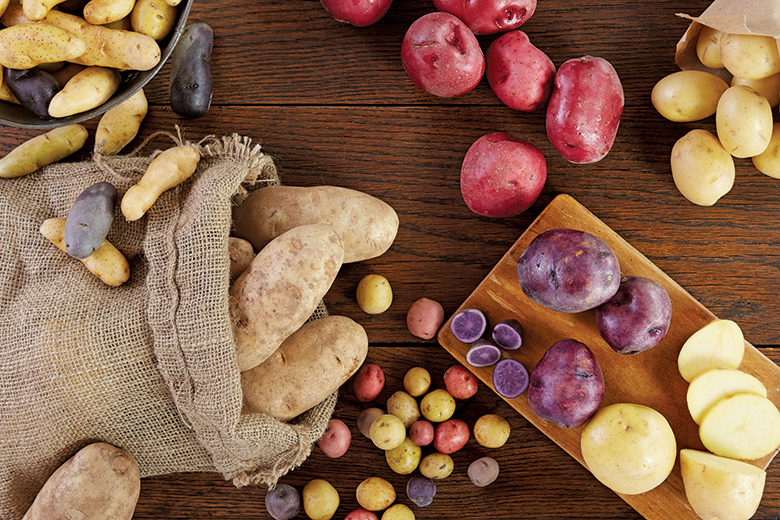
Baked, mashed, roasted or fried, potatoes are enjoyed worldwide. Ireland may have helped make the potato famous, but this humble tuber is native to the Andes Mountains and was first cultivated by Peruvian Indians more than 4,000 years ago. Today, hundreds of varieties of potatoes in many shapes, sizes and colors are grown around the world.
Potatoes have a reputation for being fattening, but this is only true when they’re fried or loaded with butter, cheese or rich sauces. Potatoes alone are naturally low in sodium and packed with vitamin C and potassium. When eaten with the skin, they are a good source of fiber. One medium-sized baked potato (with the skin) supplies about 160 calories, 17 milligrams of vitamin C and 925 milligrams of potassium, and is a good source of vitamin B6, niacin, magnesium and iron.
Potatoes fall into two primary categories — starchy and waxy — and some potatoes fall in between. With a low moisture content, starchy potatoes are great for baking and frying. Waxy potatoes have a low starch content and a firm, moist flesh that holds its shape during cooking, making these better for roasting, casseroles and potato salads. All-purpose potatoes work well in any cooking application. Choose potatoes that are clean and firm, without cuts, bruising or discoloration. Potatoes should be stored in a cool, dark location (never in the refrigerator) and kept separate from onions.
Fingerling Potatoes
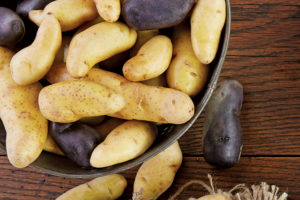
The varying colors and shapes of fingerlings add visual interest to the plate, in addition to a mild, nutty and earthy flavor. Their texture is firm and waxy, making fingerling potatoes great for boiling, baking, roasting and potato salads, but not well-suited for soups or stews.
Petite Potatoes
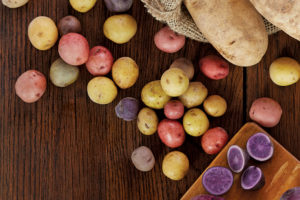
Also known as “pearls,” “marbles” or “creamer,” these small, bite-sized potatoes are the same skin and flesh color as their larger-sized cousins, as well as the same shape and texture. Their concentrated flavors and faster cooking time make petites a good choice for potato salads and roasted potatoes.
Purple/Blue Potatoes
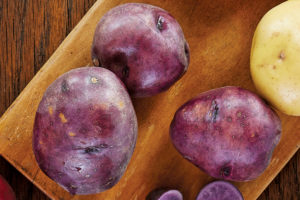
Earthy and slightly nutty, these vibrantly colored potatoes with a moist, firm flesh hold their shape well throughout cooking. Purple/blue potatoes naturally complement green salads or roasted potato medleys. The deep color is preserved best by microwaving, steaming or baking, and fades with boiling or stewing.
Red Potatoes
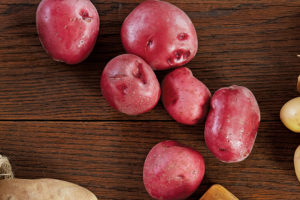
Whether roasted or cooked in a stew, the waxy texture of red potatoes stays firm throughout cooking. This makes red potatoes a winner in soups, salads and casseroles. The tender flesh and rosy skin of red potatoes adds appealing texture and color to dishes.
Russet Potatoes
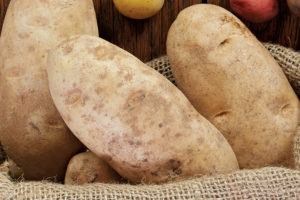
This classic potato has a fluffy, creamy and soft texture when cooked. Its low moisture and high starch content make it superior for baking and mashing and excellent for french fries and potato skins. But don’t use russets for potato salads, gratins or any dish that requires the potatoes to hold their shape.
White Potatoes
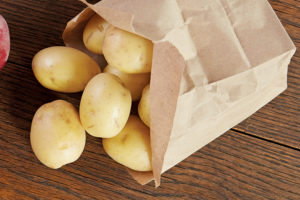
This all-purpose potato has a delicate thin skin that adds texture and flavor to any dish. The flesh of white potatoes is dense and creamy, with the perfect balance of starch and moisture. Mashed, scalloped, roasted or used in gratins, soups, salads or casseroles— the white potato can do it all.
Yellow Potatoes
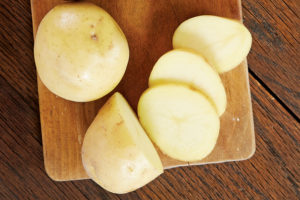
The smooth, creamy texture and just-buttered appearance of yellow potatoes lends itself well to lighter versions of baked, roasted or mashed potatoes. Slightly waxy with a moist flesh, golden-skinned yellow potatoes also stand up well to grilling, pan frying and roasting.
